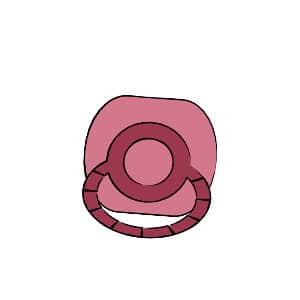Everybody likes babies. Ok, maybe not everybody, but most people. Most people like other people’s babies, even if they don’t want any themselves. The French Government likes French people’s babies. And they want them to have more. All of which leads us to that big life-changing time: being pregnant in France!
In general, having a baby is a lot more low-key in France. It is considered a normal part of life, and so it is not as celebrated as it is in the U.S. French people don’t necessarily do the whole “love, marriage, and baby carriage”.
These days a lot of people skip the big fat French wedding, before getting pregnant. And they don’t really ask “when are planning to have a baby”, like that nosy aunt busybody either.
The most anyone will ask if you are pregnant or planning on having a baby, is if they see you avoiding that ubiquitous glass of wine. And that too is only amongst close friends.
Giving birth sounds daunting in any language, but the French way of giving birth is all about making it as easy as possible and keep the birth rate high. So let’s dive in, shall we?! Allons-y!
- 1. Conceiving a Baby
- 2. No baby shower or gender-reveal Parties
- 3. Picking a hospital to give birth
- 4. Maternity leave starts 6 weeks early
- 5. Doctor check-ups
- 6. Watching your weight
- 7. Déclaration de Grossesse
- 8. Reduced Hours at Work
- 9. 40 weeks vs 41 Weeks Pregnancy
- 10. French love of the epidural (péridurale)
- 11. The D-Day (also known as Jour-J)
- 12. Naming your child
- 13. Going home with baby
- 14. Health and Vaccination tracker (Carnet de Santé)
- 15. The PMI Visit after going home
- 16. Pelvic floor exercises for Maman
- 17. Wet-nursing
- 18. Citizenship for Baby
1. Conceiving a Baby
Healthcare is free in France, and annual doctors’ visits are highly encouraged, so medical costs are not an issue.
If you are having difficulty conceiving a bébé, the French governments will pay for IVF and other treatments until the age of 43. There is some controversy around this because single women and LGBT couples are excluded, but there’s hope that this might change in the future. (Like most countries, the debates are endless!)
☞ READ MORE: French Doctors: Differences with the U.S
2. No baby shower or gender-reveal Parties
So you’ve just crossed that 3-month mark, and are ready to announce to the world that you are “EXPECTING A BABY”! Except in France (or in Paris atleast), you better turn off that Caps Lock. Most people here do a very low key announcement to their friends, usually over drinks (non-alcoholic of course), and that is it.
Once in a while, your friends will ask you how the pregnancy is going, and after, they just wait for you to announce when the baby has arrived. There are no gender-reveal parties or baby showers, or any other such extravaganza.
This might seem a bit of a party-pooper, but who feels like partying that much when you are bloated with 10 gallons of water anyway? Ok, maybe not, but I have to say, I personally preferred the low key approach.
There was something very discreet and cozy about keeping it just between our family in France, and avoiding the commercial aspect of it all.
It is also so much easier to avoid all the hype if it is a difficult pregnancy. Who feels like oohing and ahhing over a baby wipe warmer when they are waiting for important test results?
After the birth, friends will come over individually (i.e. no party here either), and discreetly give a small gift.
3. Picking a hospital to give birth
Now that you have that bun in the oven and have figured out there are no extravagant gifts, let’s go ahead and book that hospital! The general recommendation is to register yourself immediately at the hospital of your choice, because spots fill up fast.
It is a bit like the schooling districts, where your local hospital will likely take you if you are in that hospital zone, but the one further away does not. I suppose it’s good practice for all those future child applications: créche (nursery), primary and middle school, high school, university, etc.
For the most part, I would suggest sticking to the hospital that is the closest to you. There are a lot of doctors’ appointments, sage-femme (mid-wife) classes, etc. Personally, I appreciated being within walking distance.
There are 3 levels of maternity wards in French Hospitals:
- Level 1 – normal births
- Level 2 – moderate urgencies, with reanimation teams on standby
- Level 3 – the most urgent neo-natal cases
4. Maternity leave starts 6 weeks early
Paid maternity leave in France is 16 weeks and usually starts 6 weeks before the due date. There can also be additional time an employer has negotiated with the company union, similar to how French people negotiate vacation time at work.
So an accountant friend in the Insurance industry had 20 weeks, while an accountant friend in the Banking industry had closer to 30 weeks, even though they were both in the same role. (It’s good to work for a French bank!)
Now if you are in the U.S., where there is no paid maternity leave, you are thinking “wow that’s great!” If you are from Canada, where paid maternity leave is a year, you’re thinking, “what, that’s so little!?”
Paternity leave, either way, used to be a measly 10 days in France, but that has been bumped up to 4 weeks. I suppose it is better than nothing.
So on average, mat leave in France is not the best, but it is not the worst either. In Canada, you only get a portion of your salary. In France, you do get the full amount, and you can take additional congé parental where you receive a smaller amount.
Overall, c’est pas mal (it is not too bad) and with these benefits, France has the highest birth rate in Europe, a little less than 2 kids per woman.

The 16 weeks are allocated across the months, with the mandatory stoppage at 6 weeks before the due date. You could push it to 3 weeks before the birth so that you have more weeks after delivery, but your doctor has to sign off on this.
A lot of people, however, take two extra weeks earlier called congé pathologique which are fully paid and don’t count towards your allocation of 16 weeks. This is especially true if you are living in Paris, where people have long commute times on public transportation and you don’t want to be 9 months pregnant taking the metro.

5. Doctor check-ups
You can do the first 6 months of suivie (checkups) at your regular gynecologist, but after that the visits will be at the hospital. There are 3 mandatory ultrasounds, (12, 23 and 32 weeks), but depending on your doctor, they may do more or less.
If your doctor does not have an ultrasound machine in their office, and they will refer you to a clinic that does have them (the downside being that they will not be present, and the results will be sent to them later).
I picked a doctor who specialized in ultrasounds and so got an ultrasound every time I saw her every 3-4 weeks. Unless you go to a private clinic or a doctor that is non-conventionné, the full cost is covered by the government, so this is not a factor in choosing your healthcare. (Americans, eat your heart out!)
6. Watching your weight
This one may be a bit surprising, but French doctors pay close attention to how much weight you are putting on during your pregnancy. Pregnancy apparently is not a reason to have carte blanche (a free-for-all) when it comes to food.
French women in general tend to watch their weight (as opposed to certain myths that might be out there) so during pregnancy is meant to be no different. The French government recommends that women gain around 12 kilos (26 lbs) during pregnancy, and the doctor will try to hold you to that.
7. Déclaration de Grossesse
No function of French life would be complete without a bit of bureaucracy, and giving birth is no different.
After the first ultrasound, you will be given a form in triplicate known as the declaration de grossesse. To have all your costs covered, you need to send one version to Assurance Maladie (the medical system) and the other 2 versions to CAF (Caisse d’allocations familiales, the government entity that pays for all sorts of things like child benefits, rent subsidies, etc.)
I was quite alarmed by all these forms, but it was actually pretty simple. The doctor fills it out, and you simply mail them in with your name and social ID properly filled in.
8. Reduced Hours at Work
Often times mums-to-be want to wait a bit before declaring their pregnancy to their work. It is no different in French companies.
One big benefit though is that once you declare your pregnancy you have the right to work about 5-15% fewer hours (for the same salary), or in certain cases, work from home one day of the week. It depends on the type of job you have, so your Human Resources dept will let you know.
9. 40 weeks vs 41 Weeks Pregnancy
One thing I never quite figured out is why a French baby takes 41 weeks to percolate, while a North American baby takes 40. Are French babies just slow?
One explanation I got was that since they can’t accurately date the gestation, they add an extra week. I don’t get it, but I’m not a doctor.

10. French love of the epidural (péridurale)
Another thing to note is that things such as laughing gas, birth swimming pools, etc are not common in all french hospitals. So if it is important, you will have to do some research before picking the hospital.
More than 80% of French mothers give birth with an epidural, so the hospitals don’t usually have alternatives. A French friend said that the only question she had for the anesthesiologist is how quickly he would arrive.
This is very cultural. For most French women it is easy to not overthink the birth process because their friends do not. Other people’s personal experience influences their own.
The birth plan is to get the baby out!
Anonymous French Maman
Which is not to say that I didn’t have several French friends who wanted a more holistic approach. Particular clinics like Les Bluets in Paris are very popular and spots fill up very quickly, since they offer more natural options.
11. The D-Day (also known as Jour-J)
Congratulations, you have now delivered a baby! Welcome to your sleepless years!
Now Kate Middleton aka the Princess of Wales may have left the hospital mere hours after giving birth, but you French Maman should get ready to settle in for a minimum 3-4 day stay.
And you have to bring stuff. Your hospital will give you a list of what all to bring, but at the minimum you will need:
- For Bébé:
- Bodies and underclothes
- Pyjamas (depending on the season)
- Bonnet
- Diapers
- Thermometer for baby
- Thermometer for bath
- Baby hairbrush
- Baby towels
- Bibs
- Lots of socks
- swaddling cloths
- sleepsacks
- For Maman
- Pajamas
- Slippers
- Bath Gowns
- Personal toiletries
- etc, etc. etc.
As an example, I took the same bag to the maternity ward that I took to backpack around Australia for 3 weeks. And I still sent my husband home every night to bring more stuff. Get ready for a loooong stay!
New moms in France stay so long in the hospital, that French Brand Petit Bateau came out with a little “valise” (suitcase) with all the essentials for baby, including bodies, towels, sweaters, etc.
And the long hospital stay is not actually that bad. I had some friends complain about the food, but actually, I found it pretty decent. Definitely better tasting than airline food, and by that I mean better than Air France. (Which in turn has way better meals than North American airlines).
You do have the option of bringing in your own meals, but the hospital food is calibrated to get all the organs working again as they should after the birth trauma (if you get my drift), so I would stick to their menu.
12. Naming your child
In France, you only have 5 days to name the baby and register the birth. And whether it is weekdays or counts weekends is very unclear. And when I say unclear, I mean depending on the town you live in and/or the government official who have in front of you at that particular moment, and whether or not said govt. official is having a bad hair day or such.
In France, all names have to be approved by the local town hall of the city that the parents live in, so it should be noted French people cannot get too creative. In fact, until 1966 French names had to be religious, and it was not until 1993 that baby names could be a bit more “unique”, as long as they were not offensive.
As such, French parents prepare themselves with the name well in advance. The hospital will give you the form for the local town hall (depends on where the hospital is based, not where you live).
French dads usually sprint to the Mairie (Townhall) even before the baby leaves the hospital. The administrative hell that would occur if you don’t, is too painful to contemplate.
I wanted to wait and get to know the baby before officializing the name, but for my French OH this was the most stressful part of childbirth. (Men!) The responsibility to file the papers was on his shoulders and he took this very seriously.
☞ READ MORE: The Best of French Girl names, Gender-neutral names, and Boy names
13. Going home with baby
Before you get to go home with your bouncing bundle of joy, the French midwives are going to make sure that you know how to take care of your precious little one.
- Is the baby nursing or bottle-feeding properly? i.e. Is he/she putting on weight? This is a big one, and will often extend your baby’s hospital stay by a day or more.
- Can you bathe the baby correctly? The midwife will stand there and guide you through it, and then the following day is the Big Test. You or your spouse will have to replicate what you did the day before and prove that you were paying attention. The pressure is on.
- Are you changing the diaper properly?
- Cleaning the bellybutton?
- Do you need a baby ostheopath? (No idea what for.) Pediatrician? Midwife assistance at home?
- How are you planning to get the baby home? A car seat is a must or they will not let you leave with the baby.
And this is with normal full-term babies. The list will be even longer for premies and more complicated cases. If it is your 2nd or 3rd baby, they will also quiz you less, but for the first child, get ready to take some notes.
For my kids, we had all the grandparents on standby ready to pitch in, but after 4 days of parent-care lessons at the hospital, we were actually feeling pretty confident going home. (Plus I’m not sure what all the grandparents remembered about baby-ing, it had been a while!)
14. Health and Vaccination tracker (Carnet de Santé)
Before leaving the hospital, you will also get a cute little book called a Carnet de Santé which tracks all the medical records of the child (including vaccinations, dental, eyesight, etc) up to the age of 18. It is precious and irreplaceable, so don’t lose it.

15. The PMI Visit after going home
Now after you’ve brought your baby home, you are not scott-free. Your hospital has sent your information to your local PMI (Protection Maternelle et Infantile), and you must take your new-born there within 8 days.
The PMI offers free healthcare to children under 6 years old, and can provide free vaccinations, support for post-natal depression, advice on nursing, etc.
Legally, the baby must be seen every month by either the PMI or your pediatrician until he or she is 6 months old. There are other mandatory visits, as well as a medical certificate that is produced at 8 days, 9 months, and 24 months and collected by the PMI.
These visits are all free and certain visits are obligatory.

16. Pelvic floor exercises for Maman
The mother too can have her pregnancy and after-care taken care of by the PMI, although most people choose their own gynaecologist. Lactating support is offered through the PMI, as well as psychological support.
Maman will also be offered 10 sessions of kinesitherapy réeducation to get all the delicate parts back in working order, and another 10 sessions for the abs. I’ll spare you the details, but there are machines and a lot of poking around. The State takes care of Maman and Bébé.
17. Wet-nursing
Just as French people don’t make a big deal about having a baby, they don’t make a big deal about offering the boob either. Support for lactating is provided during the delivery at the hospital, and at the PMI once the baby goes home.
But amongst parents and other friends and family, there is usually not a stigma around whether or not the mother is wet-nursing. Indeed, I’ve often heard North American expats here complain that they are pressured to stop nursing after 4-6 months.
As I mentioned above, maternity leave in France usually ends around the 4-month mark. French companies are required by law to provide a secure place to pump for 1 hour per day (split into smaller periods as organized with the employer).
However, at the same time French babies are usually encouraged to start solid foods at 4 months old. So when French moms usually head back to work after 4 months at home, there is a tendency among a lot of moms to stop at that point.
18. Citizenship for Baby
Unfortunately, your baby is not automatically a French citizen, unless you or your spouse is French. France does not have the droit du sol (birthright by land) but rather droit du sang (birthright by blood).
This means that if one of the parents is French, the child will be entitled to French nationality.
If the parents aren’t French, the child may still be able to apply for French nationality at 13 years old assuming that they are born in France, and lived in France continuously for the past 5+ years. Hurray, no more paperwork!

So there you have, all you need to know about being pregnant in France! For some fun baby-related French-English flashcards have a look at our free printable below.
If you enjoyed that article, you may want to read more about preparing a gorgeous French-style nursery. A bientôt!







Like!! Great article post.Really thank you! Really Cool.